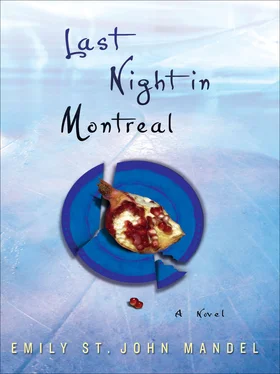“I don’t know. Maybe. I wanted to see Chicago again.”
“Seems impossible that he’d be around, after what happened,” her father said carefully. “Doesn’t it?”
“Yeah.” Lilia had turned a corner; she was looking up and down the street, but Erica was nowhere. “It must have been someone else. But it seemed like he was watching me.”
“I’m worried about you,” her father said.
“Don’t be. I’m always fine.”
“I know you’re always fine,” he said, “but there’s no reason to be traveling quite so constantly these days, wouldn’t you agree?”
“You taught me how to travel.”
“Quite true, my lily. However, since you were so clearly paying attention to my example, you’ll notice that I did eventually stop. Have you considered settling somewhere for a year or two, just as an experiment?”
“The thought does cross my mind occasionally.”
“No one’s watching you anymore.”
“How can you be sure?”
“Because you’re not an abducted child, you’re a legal adult. No one has any reason to be looking for you. You successfully disappeared.”
“A private detective could still look for me.”
“He was in an accident,” her father said softly.
“He was from Montreal, wasn’t he? It made me want to go there. Just to finally face it.”
“Of all places,” said her father. “Don’t.”
There was a cufflink under the bed when Christopher reached down for his slippers that morning. That morning; a few months after he’d taken Lilia’s case. He picked it up with the care of a jeweler handling a diamond, examined it from every angle, held it to the light. It was unextraordinary. It also wasn’t his. His wife lay sleeping at the far edge of the bed, close against the wall. Christopher dressed slowly and put the cufflink in his pocket. He felt that the right thing to do in these circumstances would be to wake her, either to ask her or just to hold it up in silence until she said something, wept, denied, confessed, but his thoughts were scattered, he couldn’t bring himself to do it, and he realized as he watched her sleep that he was thinking of lions. Of chasing his future wife down the midway when they were eleven and ten, of traveling with her across the length of nine provinces and thirty-four states, over the border and back again. He ran two red lights by accident on his way to work that morning.
The cufflink was composed of two plastic buttons with a bit of wire between them, obviously from a very cheap shirt. He sat at his desk, turning it over and over between his fingers. A salesman? Door-to-door? Vacuum cleaners? Insurance? Days had passed now since he’d found it, and he’d hardly been home. His wife hadn’t commented. She was working longer hours herself, and she’d been unusually courteous of late. Polite strangers in the bedroom. They barely spoke. But he still imagined, watching her sleep at night, that all of this might still be salvageable in some way. He sometimes touched her pale hair on the pillow and imagined what he might say to her if he had the strength of will to say it. He felt that he was working his way up to something, an action of some kind, some redemptive collection of words that would restore his marriage and bring her back to him and make Michaela reachable again, all at once. It wasn’t impossible. He began a separate set of notes, somewhat random, unrelated to Lilia’s case. Notes on the second law of thermodynamics, memorized in high school: The second law of thermodynamics states that all systems tend toward entropy. Is this irreparable, or might the process be reversed? Notes on Michaela: skittish, secretive, brown hair, green eyes. Notes on his wife: governed inordinately by the second law of thermodynamics. He was careful to keep this notebook separate from the other ones and leave it at the office; he labeled it Family and put it in a drawer. He read through these notes sometimes when it was late and he’d been working all day and he couldn’t read one more word or make one more phone call about his missing Lilia. Michaela: always quiet at dinner, can’t meet her eyes across the dinner table some nights. The feeling of one’s daughter having been replaced by a changeling. Elaine: barely sleeps, but never seems tired. Red garnet earrings. Matching red nails. He wished to come home one evening and perform a pulling-together motion, like tying a piece of string; he spent a great deal of time thinking about how he might achieve this, and these other notes felt like preparation; at some point, he felt, he’d have amassed enough evidence to have a complete picture of the situation, at which point he could act decisively and pull things back together again.
There were a few days when he felt that the preparations were going smoothly, that he was approaching the level of understanding that he needed, but then there was a tie he didn’t recognize on the floor of his closet. He saw it when he was getting dressed on a particular morning, a week or two after the cufflink; it lay discarded, as if thrown carelessly from elsewhere in the room. But the angle didn’t work; he’d tried to throw things into the closet often enough to know that it just wasn’t possible, things thrown from the room hit the wall or the closet door, even if the closet door happened to be open, ergo, the tie was obviously planted. He was a detective, for God’s sake. He knew he was being baited and that he should say something, that he was meant to say something and that saying something might even help, but the tie made everything seem foreign and unsalvageable and impossible again. On the way to work he talked to himself, trying to summon something — sadness? anger? — alarmed by a soft but unmistakable sense of relief. At least, he thought, things were becoming clearer. Much later he sat at his desk in the dwindling evening, looking at the cufflink and lost in the past.
He’d met his wife when they were children in a traveling circus. Strange upbringing by most standards, but it had seemed normal at the time: his father was a lion tamer, and her parents walked on tightropes. A childhood played out across a thousand dusty towns between Vancouver and Halifax, in the bright perilous years when most people still took their kids to circuses and everyone was waiting for the atomic bomb to drop and the Soviet Union was still the dark empire far away across the sea, and Elaine had permanently skinned knees and ribbons in her hair and ferocious arguments with her parents. She came from a long line of tightrope walkers; her parents didn’t understand why their daughter hated the profession so much, and were somewhat inclined to take it personally. There were winters spent waiting for the season to start, staring out the classroom window at the winter sunlight thinking about leaving again, meeting Elaine in the hallways and counting down the days with her—“Twenty-eight days,” she’d say mysteriously, as she passed, and the other kids around them pretended not to be envious because everyone wants to travel away with a circus, “Fifteen days,” “Four,” until finally she could whisper “Tomorrow,” with her eyes all alight, because even if she didn’t want to be a tightrope walker, the thought of going to school for longer than a semester at a time seemed unbearably stultifying to both of them; and then in the very early morning, the long caravan of transport trucks moving east out of Calgary while he lay on the floor of their moving house reading Spiderman comics. Elaine, his best and only friend, sometimes traveled in his family’s trailer with him between stops. He kissed her for the first time between Ottawa and Toronto.
Decades later in Montreal he closed his eyes, his fist clenched over the cufflink, rested his elbows on his desk and his forehead on his fists. He remained that way for several minutes, unmoving, and then straightened very slowly, placed the cufflink in the drawer that held Michaela’s school picture, and reached for the stack of files on the edge of his desk. He opened the top folder and unfolded a map with Lilia’s name written twenty-eight times in the margin. He was beginning to neglect his other cases.
Читать дальше












